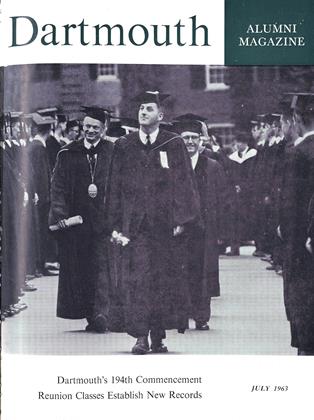THE largest graduating class in Dartmouth's history - 695 men — received the Bachelor's degree in exercises held Sunday morning, June 16, on the lawn of Baker Library. Many an anxious eye looked skyward as rain clouds scudded above the Commencement throng, and there was a light sprinkle now and then, but the outdoor program went off successfully, thereby saving from acute embarrassment the 1963 class officers who had opposed the College's original plan to hold the exercises in the new Leverone Field House.
Not only was the senior class of record size, but the conferring of Tuck School's M.B.A. degree upon 85 men on Commencement morning rather than at separate and earlier exercises, and the award of degrees in medicine to 33, advanced degrees in engineering to 17, and Masters' degrees in course to 22, all helped to produce the largest June graduation program the College has experienced. And the crowd in attendance was correspondingly larger than ever before, completely filling the Baker lawn.
The conferring of eight honorary degrees (for which citations are printed on pages 18-19) provided the customary "special attraction" of Commencement morning. Four Dartmouth alumni were among the recipients: Judge Sterry R. Waterman '22 of the U. S. Court of Appeals, LL.D.; Philip B. Gove '22, editor-in-chief of Webster'sThird New International Dictionary, Litt.D.; Professor M. Stanley Livingston, M.A. '28, of Massachusetts Institute of Technology, Sc.D.; and Emil Mosbacher Jr. '43, skipper of the Weatherly, A.M. Also honored were U Thant, Secretary-General of the United Nations, LL.D.; Eldon Lee Johnson, President of the Great Lakes Colleges Association, LL.D.; The Rev. James H. Robinson, founder of Operations Crossroads Africa, D.D.; and Governor John W. King of New Hampshire, A.M.
Dr. Robinson's Commencement Address, entitled "The Second Emancipation," dealt with the current racial crisis in the United States. He spoke of the urgent necessity of giving the Negro, now and at the grass-roots level, his rightful place in American life. "This second emancipation," he said, "must be an act of conscience, voluntarily on the part of individual citizens, groups, churches, labor unions, educators, politicians, and business concerns to make the race problem their problem and the nation's problem, not just the Negroes' problem." Without a solution, he warned, the nation faces its most dangerous crisis since the Civil War. One hopeful sign for the future, he added, is that young people, especially those in the colleges, are facing up to the issue.
The full texts of Dr. Robinson's address and of the graduation valedictories by Alan K. Palmer '63 and President Dickey are printed in this issue.
Class DayWas AMoist Affair
The Start: Class of '79 Trumpeters sound a fanfare.
The End: And a happy one for 695 seniors, including Earl S.Eichin Jr. '63, shown getting his diploma from Dean Thaddeus Seymour at the graduation exercises on Sunday, June 16.
Class Day exercises had to be moved indoors to Webster Hall.
The Sachem Orator's four-footed transportation, unused toauditoriums, has to be steered cautiously down the aisle.
Head Marshal Bill King, Class President Jim Valentine, andLouis Gerstner, who delivered the Address to the Old Pine.
The traditional Class Day pipes were smoked in Webster.
Hopkins Center provided a fine new setting for the Friday evening concert by the Dartmouth Band.
Brig. Gen. Peter C. Hyzer (l), U. S.Army Corps of Engineers, who spokeat the ROTC commissioning ceremony,poses with Col. Joseph W. A. Whitehone, commandant of Dartmouth'sArmy ROTC Unit.
The 1963 Aegis gets the undivided attention of LeeErdman '63 and his date for Commencement.
The last quarter mile: smiling seniorsmarching from Alumni Gymnasiumto the Baker Library lawn for thefinal exercises at which they receivedtheir A.B. degrees. Shown in frontare Douglas B. Johnstone '63 (left)and Albert N. Graves III '61. ' '
Crutches Row, up front, for injured seniors at Sunday's graduation.
 View Full Issue
View Full Issue
More From This Issue
-
 Feature
FeatureThe Second Emancipation
July 1963 By THE REV. JAMES H. ROBINSON, D.D. '63 -
 Feature
FeatureHONORARY DEGREE CITATIONS
July 1963 -
 Feature
FeatureThe Alumni Council's 50th Year
July 1963 -
 Feature
FeatureThe Past Is Prologue
July 1963 By T. DONALD CUNNINGHAM '13 -
 Feature
FeatureA Record-Breaking Reunion Week
July 1963 -
 Feature
FeatureThe Honesty That Is Dartmouth
July 1963 By ALAN KENNETH PALMER '63
Features
-
 Feature
FeatureHorton Hears a Heil
April 2000 -
 Feature
FeatureLife of a Class Agent
April 1939 By Davis Jackson '36. -
 Feature
FeatureMud, Madras and Madness!
July/August 2005 By Gina Barreca ’79 -
 Feature
Feature"Three ... Forty-two ... Hut"
SEPTEMBER 1984 By Jim Kenyon -
 Feature
FeatureWhat's So New About It?
MAY 1973 By Joanna Sternick, A.M. '72 -
 Features
FeaturesWhale Watch
JANUARY | FEBRUARY 2024 By Svati Kirsten Narula ’13





